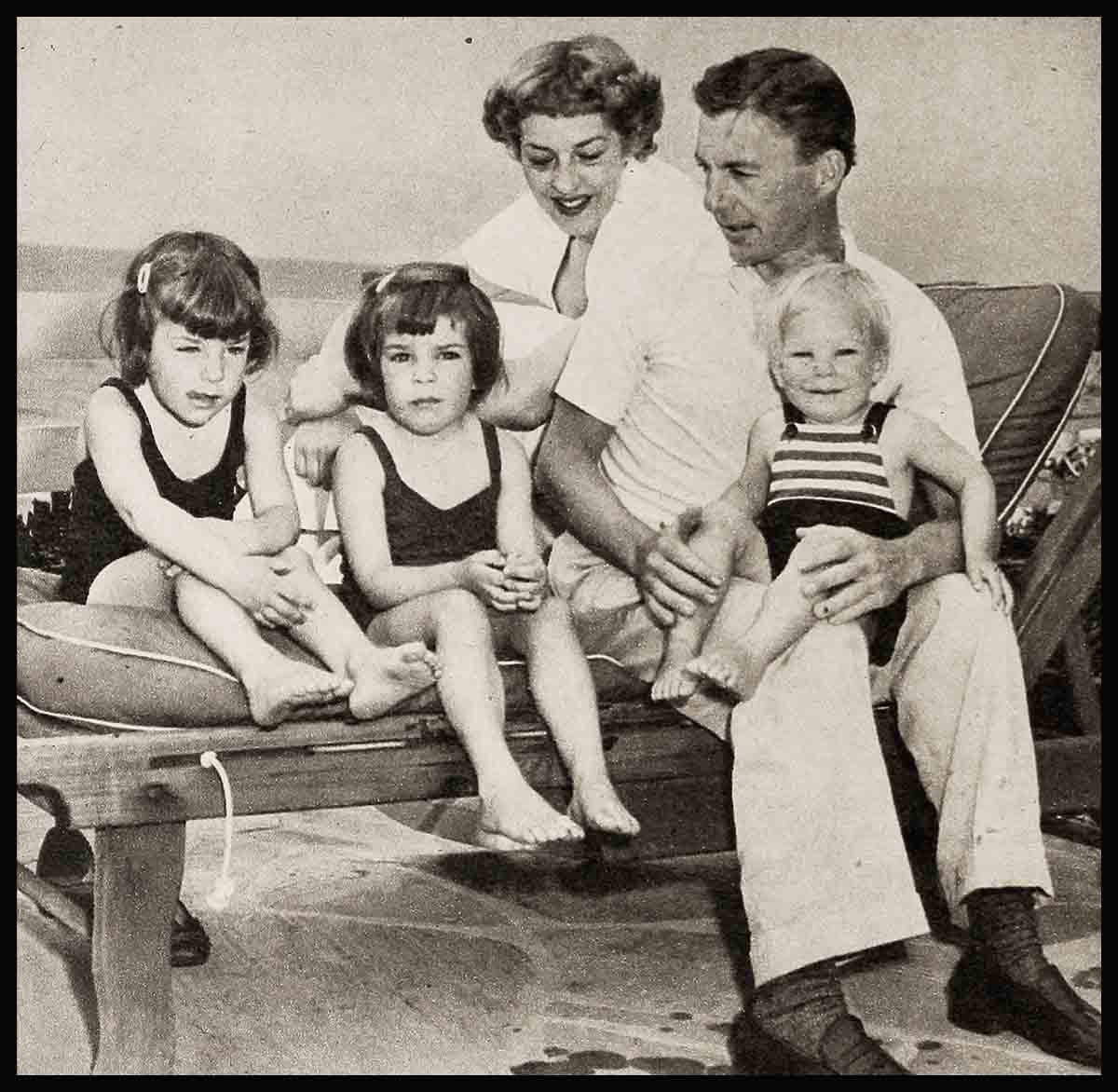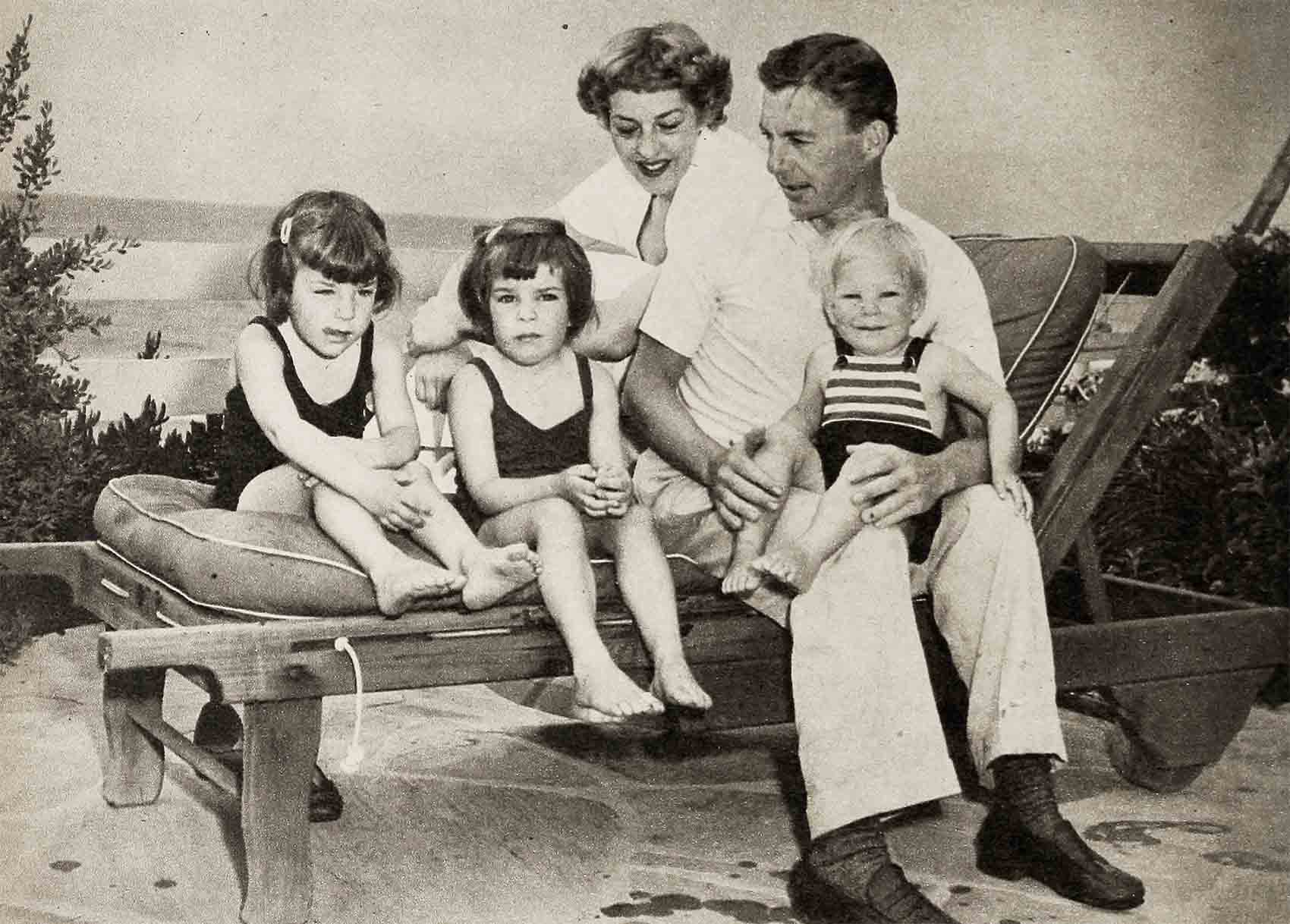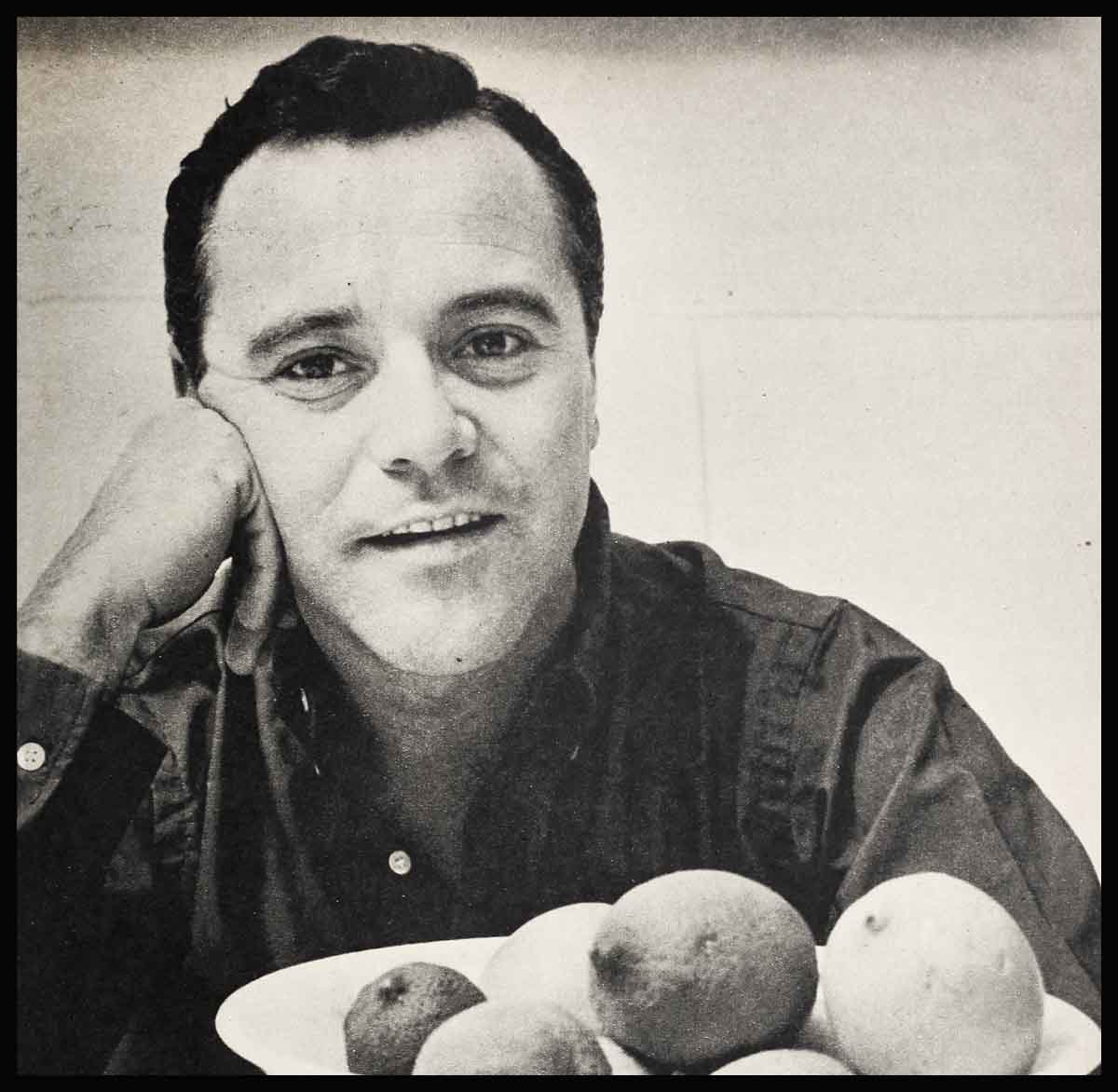
Return To Faith—David Wayne
When I was seven and the minister of our Baptist Church in Bloomingdale, Michigan, thundered forth the phrase, “And the fiery wrath of God shall descend upon you!” I misunderstood him. I had never heard the word “wrath” until this Sunday morning. I thought he had said, “And the fiery raft of God shall descend upon you!”
I knew what a raft was. And I had a sneaking suspicion that I must be a sinner. All the shuddering way home I could see those flaming logs falling on me.
What made it .worse was that up to that time I did not picture man as in God’s image; the best I could do was picture God as in man’s image. The man I felt He must most look like was my grandfather David McMeeking—a towering patriarch with a long, flowing, white beard. Grandfather was to me all-powerful. He could swing me high aloft with one arm. He would also give me dimes and pat my head. I loved him . . . why would he want to throw burning logs on me? It dismayed me and perplexed him because I stayed away from him for days. Finally I me to the conclusion that he would never think of doing such a terrible thing. There was only one other answer. The minister must have been telling a lie. There was no such God . . . perhaps there was no God at all!
It was a pretty early age to embrace agnosticism, but there it was.
My subsequent childhood contacts with the church didn’t help to remove any seeds of suspicion thus sown. In Sunday School the teacher made a lasting impression on me—and not a good one. She told her open-mouthed pupils that they all had a rope within them, and that every time they told a lie another knot formed itself in the rope. I had told my quota of lies, and at that moment I became conscious of a bellyful of kinks. Every time thereafter when I would catch myself fibbing, my hand would clap itself over my stomach automatically and I would be overcome by a wretched feeling of misery. To this day I can’t see a rope without a sensation of discomfort.
It began to become plain to me that by the tenets of our church I was a lost soul. Since no one gives himself up without a fight, I refused to accept this. It was easier and more pleasant to take another tack—disbelieve the church. And I did.
I made my foster parents, Mr. and Mrs. Albert Hodgman, who still live in Bloomingdale, pretty unhappy with my attitude. I would question their most cherished beliefs. I remember, when I was about 14, attending the Methodist Church one Sunday and then coming home and telling my foster father I saw no difference at all between Methodism and our own Baptist faith. “Besides, there weren’t any more people at the service than come to our services,” I added. “Hardly a third of the church filled. If they are the same, why don’t they just have the one church and save on ministers and buildings?”
He argued that there was a difference, but the only one he could name was the form of baptismal; the Baptists believed in total immersion while the Methodists just sprinkled. I saw this as just a variation in symbolism and was not convinced.
I persisted as a skeptic, though not a hard-bitten one, well into adulthood. I would waver during boyhood crises, For instance, once I was forbidden to drive our Model T and took it out anyway. It got stuck in a ditch. I was desperate to get it out and back in the garage before my foster parents, who were away, would arrive back home. When the wheels spun uselessly and all my heaving failed to budge the car, I decided to give Divine Intervention a chance . . . I prayed. Almost immediately—and it was a bit Tightening as well as a relief—a farmer tame along with a team of horses, and bulled me out. But my old attitude soon returned. What I needed was a much more believable God, not one so disconcerting—at least He was disconcerting as originally presented to me.
When I was 17 I left home to study at Western Michigan College at Kalamazoo. There was a good bit of religious activity around the campus, and I attended a few rallies held to foster faith among the students. The theme of the talks was always “Go to your church,” but neither the people who presented them nor the way they went about it convinced me. There was always a sort of “save yourself” motivation to their appeals, and this seemed to me (and still does) a selfish basis for sparking a man’s faith. Roughly, think I felt that church should represent a chance to serve others, and thus God; rather than serve God, and thus yourself.
There was one other way in which I felt that the church was improperly regarded. When I would come home during vacations and show no particular desire to attend services, my folks were hurt. To go to church was a family custom. Not to go was not only to exhibit lack of faith but reflect on the family. I felt all sorts of weight on me to go. I felt that I was regarded as being smart-alecky for not going. But custom is something one does from habit; without thought, and I could not help feel that such mechanical piety was not in reality true religious observance. Still I went, to please my folks, and felt that if there was a God he should resent my being there.
I think that, though I was a young man by this time, I was still conscious of God as a being; to some extent He was still a man who resembled Grandfather McMeeking but was not personally as nice as Grandfather. No great change in my views was going to occur until I would come to think of God as an idea, a conception of that phase of our existence which cannot be touched, weighed, or even located, which is called the soul, and which gives us the thought and emotion which characterizes the human animal from the other animals. And I know I was seeking this idea without being aware of the fact that I was on such a search. When I left college to work in Cleveland, no one there urged me to go to church . . . and there I did go. I went most often those days to the Unitarian Church where, it appeared to me, there was more of a discussion of the significance of God than a constant exhortation in His name.
In this way I grew up, without faith, you might say; and yet ay I am a man of faith. It isn’t a formalized faith, yet it is a deep and true one. No one preached it to me, no one opened my eyes to it—it just came . . . and it is still coming. I found it part of love, when love came to me. I found it part of the immensity of the sky when, all alone, I lay in a slit-trench underneath it. I found it the only explanation for the wonder of the birth of my children, my own flesh and blood. I find it now in a growing consciousness of something above and beyond the words and the deeds of everyday life. I know that it comes to others this way, too.

On January 1, 1942, I sailed for the war front. as a field service volunteer ambulance driver. I was attached to the British 8th Army in Libya and Egypt for 18 months, eight months of this time under fire in the Tobruk and El Alamein campaigns. Not to believe in God there, in the awesome flatness of the desert under the vault of the heavens, was an impossibility. Here came my conversion to faith, not once, but again and again. The sweep of God’s hand, evident in the vast distances everywhere before my eyes, was conducive to the swelling of the soul . . . and it swelled, I knew, for and about Him.
I was not far from the Holy Land those days, and now when when Christmas comes and my children ask for the story of Bethlehem, I am considered the most authoritative source. I try to do a good job but it is a little disconcerting when my audience, composed of my twin six-year-olds, Melinda and Susan, reveal that their curiosity extends only to the presents the Christ Child got. “Were His as nice as ours?” they want to know.
On the other hand I disappoint them at times, particularly in the matter of prayers. Prayers, it seems to me, are truly learned in childhood or never. I have since committed the popular prayers to memory, but they don’t stick. Once, after a six months’ tour away from home, I started to lead Susan in bedtime prayer, as usual. I got as far as “Now I lay me down to sleep . . .” and couldn’t think of the rest. She waited a moment then burst into tears.
Actually, I make no attempt to instruct my children in religion; rather I try to answer their questions as clearly as I can. When the twins wanted to go to Sunday School, my wife and I sent them. I think I would like the twins, and two-year-old Timothy, when he gets old enough, to go to church—not only the Protestant church, but the Catholic and Jewish churches as well. I think it will not harm them to know all the ways in which God is sought. I know it will set them to thinking, and if they can think their way to faith, as well as feel their way, the bond will be that much stronger.
My closest friends are of all faiths . . . and I know no better people. When the United States entered the war, I returned from abroad and joined the American army in which I was assigned to officers’ training school at Camp Lee, Virginia. A fellow student who graduated from school with me was Andy Levine, an old Jewish friend from Kalamazoo. Andy was my best man when I got married in the Little Church Around the Corner in New York. He fell so in love with the ceremony that when he wanted to get married he asked me to see if he, too, couldn’t get married there.
I talked to Dr. Randolph Roy, the Episcopalian minister of the church, and at first he could not see how this could be accomplished. The tenets of the church expressly forbade such a marriage at its own altar, But from the start of the war there had been established a Victory altar in the chapel, and it was there that Andy was married. I have seen Dr. Roy many times since then, most often at the Lambs Club in New York, and he always makes the same inquiry: “How are my friends, the Levines?”
When I left for Africa as an ambulance driver, I carried with me not only Andy’s good wishes but a Catholic prayer book given me by the mother of another boy friend. She came to me at a farewell party held for me and thrust it into my hand. “This will bring you through,” she said. “Keep it with you always.”
At that time my faith was not what it is today. Yet I kept the book on me, in a side coat pocket, always. I never read it but, after a few close calls in battle, it began to mean something. When I got back to the United States, I heard one day that this Catholic boy was in the army and about to sail for Europe. It suddenly became most important that I get his mother’s book to him. There was no question in my mind but that he would come through, as I did, if he took it along. I made a trip to New York to present it to him. He came back unscathed.
This may seem an odd mixing of the faiths and the symbols which denote them: a Jewish boy married by a Protestant minister; a Protestant boy finding protection in a Catholic prayer book; a Catholic mother who extends the good words of her belief beyond her faith. But I feel it is eminently right. Whatever else the way of God, it must be boundless. I used to think that I had traveled to the outskirts of His domain before at last I turned to face inwards and retrace my steps again. But did I? Couldn’t I have gone much further and still not go beyond Him when once belief came to me?
I was married hardly more than a year when I first went to war. I wrote many letters back to my wife, Jane, from North Africa. But the one I recall best had the following line in it: “I have come to believe again in a God.”
I have.
THE END
—BY DAVID WAYNE
(David Wayne will soon be seen in 20th Century-Fox’s Tonight We Sing.)
It is a quote. PHOTOPLAY MAGAZINE DECEMBER 1952





No Comments